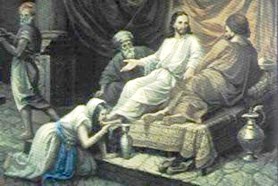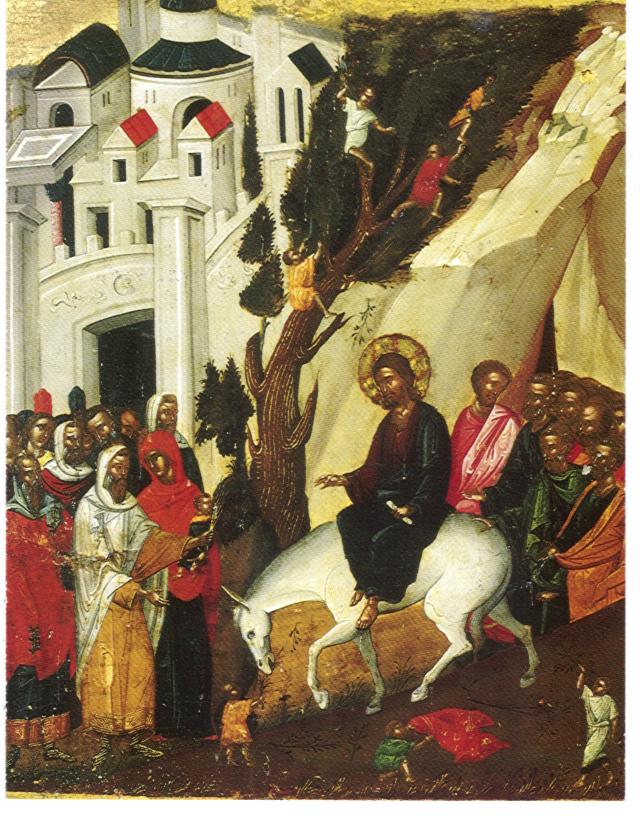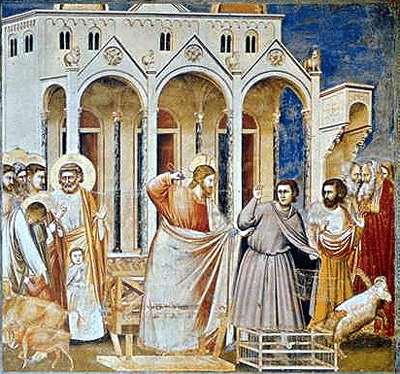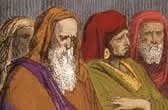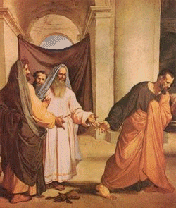PALM SUNDAY
CLAMOUR
And the multitudes that went before,
and that followed, cried, saying,
`Hosanna to the son of David; Blessed
is he who comes in the name of the
Lord; Hosanna in the highest.'
Matthew Ch. 21:9.
The multitude .cried out the more,
saying, let Him be crucified.
Matthew Ch. 27:23.
Full readings: Palm Sunday procession – St. Matthew 21.1-11
Mass readings: Isaiah 50. 4-7; Psalm 22; Philippians 2. 6-11; St. Matthew 26.14 – 27. 66.
Holy Week begins and ends with demonstrations from the Jewish people and highlights the fickleness of the people in contrast to the constancy of Our Lord. On Palm Sunday our Lord resolves to ride into Jerusalem and expose Himself publicly, even though He realised the dangers as the Jewish religious leaders have been clamouring for His arrest, especially after the raising of Lazarus from the dead. From the Roman Governor’s view, this was a dangerous time to keep peace and order with the impending Jewish Passover festival and the last thing the Roman authorities wanted was a riot stirred up by religious fanaticism. So when Christ enters Jerusalem the atmosphere is tense.
As Our Lord set out from the Mount of Olives for the final descent into the holy city many people had gathered on roadside to welcome Him. Many of these had no doubt witnessed His healings, and listened to His preaching, but some perhaps were there to have a glimpse of this Christ Who had been causing a stir by His rather teaching that constnatly challenged the Law. As crowds go this would not have been much different from any other crowd then and ever since. The majority found themselves going along with the general consensus, which was to acknowledge joyfully Jesus as a king. Yet within five days the consensus changed to crucify Him. The Jewish religious leaders had no difficulty in relying on mob hysteria and fickleness. There was something better in the air for them on Good Friday or so they thought!
The central figure of Palm Sunday is our Blessed Lord despite the clamour from the crowd. His teaching on this day is simple for His followers, but difficult for the bystander: peace, illustrated by riding into Jerusalem on a donkey, not a horse as the Roman Governor entered the city. The Prince of Peace proclaims that His kingdom is one of peace. There is no violence, no retaliation, no retribution in His kingdom. Two wrongs never make a right under any circumstance in His kingdom. Palm Sunday teaches us to absorb all the hurts, heartaches and the brokenness, otherwise peace will never reign in us or in the world. Peace comes from turning the other cheek, going the extra mile and giving and giving of self and time to others until we are drained just as our Lord was drained for us.
So Palm Sunday gives us the opportunity to examine our own faithfulness to Christ. On this wonderful day when we process and wave our palm branches and take our palm crosses home for yet another year, it is all so easy to be caught up with the excitement of it all and be carried along by the very moving Palm Sunday liturgy. The test comes the next day. Are we prepared to stay with Our Lord in Jerusalem as the atmosphere changes towards Him? Do we dare to stand by Him as He faces constant conflict with the religious leaders? Do we love Him enough to want to bathe His weary feet? Do we stay with Him in prayer in the Garden? Are our bodies and souls drained as He dies on the Cross from our devotions? All these encounters should be included in our cry of “Hosanna to the Son of David: Blessed is He comes in the name of the Lord” to-day.
As well as Palm Sunday piercing our souls for faithfulness for the whole of this Holy week, it also should pierce our conscience in regards to our overall faithfulness. Again like Palm Sunday festivities, it is rather easy to strive towards holiness when everything seems to be going well but when the bolt out of the blue strikes, what then? When we have to suffer endlessly whether through physical or spiritual pain, especially if it is inflicted on us by others, what then? When God seems far removed from us and all is dark and despondent, what then? When life seems empty and aimless, what then? Has our faith rooted itself deeply enough to help us cope with these situations, so that they do not control us? Can we see such situations as growing times in holiness or better still to be more Christ-like? Or are we fickle? Use this week as a growing time in faithfulness to Christ.
As I welcome you this day with my palm branch and sing my “Hosannas”, may it be done with sincerity and in the knowledge that before I welcome you as the Risen Lord on Easter morn, my knees must watch and pray with Yours in Your agonised moments in Gethesamene, my feet must tread with Yours along the streets of Jerusalem, and my soul experience Your anguish and grief on the cross. Give me Your grace to follow You my Lord to Calvary. Amen.
HOLY MONDAY
ANOINTING AND CLEANSING
Mary took a pound of costly perfume made of pure nard,
anointed Jesus’ feet, and wiped them with her hair.
John 12. 3.
Just as Jesus challenged the hypocrisy of the Temple system so does He challenge and confront every kind of hypocrisy and insincerity, all cheating and deceitfulness in our lives and societies. Any act that cannot stand the piercing glare of Christ has to be either purged or extricated from us. Hypocrisy is the direct opposite to purity, and thus we have to remember our Lord’s saying that only the pure in heart will be able to see God, and enter His kingdom.
Put in the form of another of our Lord’s teaching, we cannot serve both God and mammon. In our quest for holiness, all dross must be purified. We need to be cleansed regularly from sin. We have to let the Spirit be like the heavy dew settling on the frosty ground. Bit by bit the dew saturates the ground until the frost begins to melt. Although at first it seems improbable, the soft dew will eventually melt the hard frost.
Holy Monday therefore demands us to examine our lives to see whether they glow with Christ’s purity and honesty, and to examine whether we live by Christ’s commandments or our own watered down version of them. After confronting ourselves through Christ’s eyes, the comforting factor of this day is that we can be cleansed of all that is not pure and honest within us.
On this Holy Monday let me dig deep to discover the impurities within me dear Lord through the cleansing power of Your Spirit. Having acknowledged them, let my actions and thoughts from now onwards be such that they can withstand Your penetrating Light. Amen.
HOLY TUESDAY
AUTHORITY
Now has the Son of Man been glorified.
John 13.31.
Full readings: Isaiah 49. 1-6; Psalm 7.1-6, 15-7; St. John 13. 21-33, 36-8.
This Holy Tuesday God’s authority must confront us. We have to ask ourselves by whose authority do I live? It is not mine, certainly not the State’s, but God’s as the Giver of all life. However sometimes we forget that God is the supreme authority, and allow ourselves to be captivated by seducing demonic powers such as drugs or even Satan himself. If we allow this to happen for too long then we shall end up like the Pharisees having a hollow sound to our lives.
Even Christians who try to live under God’s authority must allow that authority to penetrate their very being on Holy Tuesday to determine whether their life is pharisaic at all. It is all so easy to be seen praying in church, but are we really praying? It is all so easy to be caught up with the angelic singing of the choir and yet not to be thinking of God at all or why we are in a church or chapel. It is all so easy to set an hour aside for prayer and then spend most of it day dreaming. It is all so easy to visit someone in hospital and think this is my good deed for the day. And so one could go on. What it means that it is almost too easy for us to be like the pharisees, “whited sepulchres, which indeed appear beautiful outward, but are within full of dead men’s bones, and of all uncleanness” (Mt.23.25). So what Christ said about the Pharisees and Scribes, He could also say about us. If we take Holy Week seriously, we must heed our Lord’s warning and authority that we must not be outwardly what we are not inwardly. If we learn to be humble and not seek any kind of exaltation then we shall not fall into the Pharisees’ trap.
HOLY WEDNESDAY
BETRAYAL
Judas Iscariot, went unto the chief priests,
And said unto them, `What will you give
me, and I will deliver Him unto you?'
And they covenanted with him for
thirty pieces of silver.
And from that time he sought opportunity
to betray Him.
Matthew, Ch. 26:14-6.
Lancelot Andrewes in his 1593 Lenten sermon at Court contrasted the difference of living lovingly for Christ or lovingly to self as he compared Mary and Judas:
For she did not drop but pour; not a dram or two, but a whole pound; not reserving any, but breaking box and all; and that not now alone, but three several times, one after another.This she did; and, as it may seem, the coherence fell out not amiss. This outward ointment and sweet odour she bestowed on Christ for the oil of gladness, or the spiritual anointing (as St. John) and the comfortable savour of His knowledge (as St. Paul calls it), He bestowed on her.
This, as it was well done, so was it well taken of Christ; and so should have been of all present but for Judas, says St. John. Who, liking better odorem lucri ex re qualibet than any scent in the apothecary’s shop, seeing that spent on Christ’s head that he wished should come into his own purse, repined at it.
This Holy Wednesday we have before us two options: the selfless loving and caring of Mary towards her dear Master and Lord, and the selfishness and greed of Judas who used Jesus for his own ends. Friendship as I said implies trust, and when we make a person a friend it means we love that person, despite what. From that moment we always try to think and anticipate their needs before ours; we desire the best for them. Yet how often have we been a Judas rather than a Mary and let a friend down? How often have we simply used another person, hoping that we might gain something from it? 

Sometimes we might even do this unconsciously. We do have to keep examining our motives so that we are not exploiting another human being. Ideally in a Christian community, the corporate body of Christ to which all the baptised belong, we share and gladly share our gifts, talents and personalities with our brothers and sisters. In this kind of community the self is fused with the core so that in the sharing of life the self is always part of the whole; it can never be separated from it because the influences, beliefs, and personalities of others are absorbed by one and mingle with one’s own. With such Christian sharing one forgets or ignores what was originally his or hers, if ever that were the case!
Our Lord commended what Mary did, and He must have agonised over Judas’ deed, especially in the light of His teaching to His disciples that “Greater love has no man than this, that a man lay down his life for his friends (Jn.15.13). Even after betraying our Lord, Judas committed a greater wrong in being unrepentant of his deed, and died in a state of hell, that is, without Love. He was not there to greet the Risen Lord on Easter morn, but Mary was? Will we?
Let me be like Mary and believe in You as my Friend as well as my Lord and Saviour. Teach me to live that I do not betray You by my actions and words, and especially not by selfish acts of greed and exploitation. Grant me the grace to be a true friend to all I meet in life. Amen.
